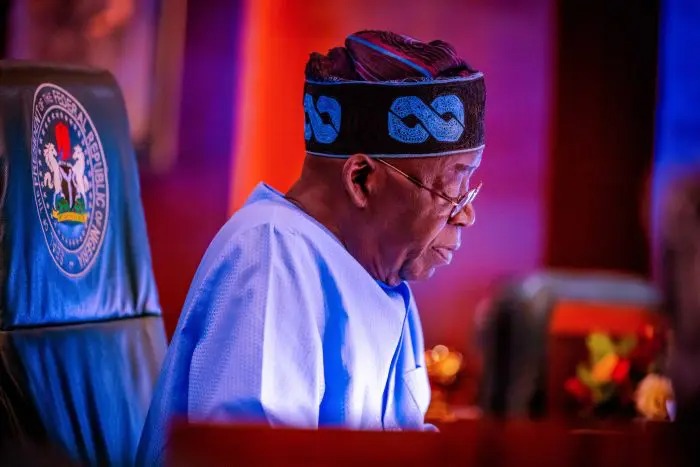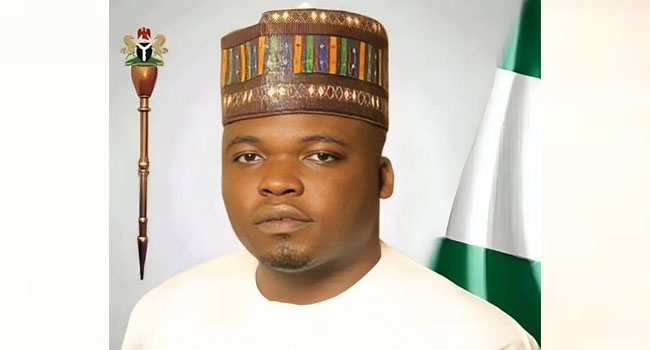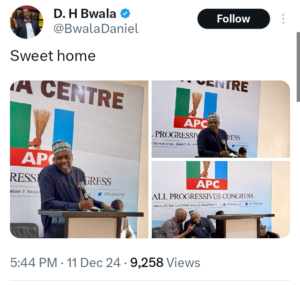The ruling All Progressives Congress (APC), on Sunday, stated that it was not intimidated by the weekend visit of former presidential flag-bearer of the New Nigeria People’s Party, Senator Rabiu Kwankwaso, and former Cross River State governor, Donald Duke, to the Abeokuta, Ogun State home of ex-President Olusegun Obasanjo “to discuss the political future of Nigeria.”
In recent weeks, there have been growing debates about the 2027 general elections after the Secretary to the Government of the Federation, Senator George Akume, advocated for the re-election of President Bola Tinubu for a second term.
According to Akume, there will be no vacancy in Aso Rock until 2031, when Tinubu would have completed a second term.
However, the opposition has rejected this notion, insisting that the ruling APC would be removed from power by 2027.
Over the weekend, Kwankwaso and Duke, a 2007 presidential aspirant, visited ex-President Obasanjo in Abeokuta and held a closed-door meeting.
Although the specifics of their discussions remain undisclosed, sources close to the leaders suggested that the meeting was part of a broader effort to strategize for Nigeria’s 2027 general elections.
Obasanjo, a key figure in Nigerian politics, has been actively engaging various stakeholders to explore alternatives to the ruling APC and the opposition Peoples Democratic Party.
The ex-President has recently been highly critical of Tinubu’s administration, condemning alleged corruption and rising debt burdens.
Kwankwaso, an influential figure in Kano State politics, brings significant clout and followership, while Duke, a former governor from the southern region, is expected to offer his unique perspective on governance and national unity.
Though the details of their conversation remain confidential, Kwankwaso’s statement after the meeting suggested a collective intention to challenge the existing political structure and pave the way for a new direction in Nigeria’s political landscape.
Confirming the meeting via his verified Facebook page, Kwankwaso stated, “I was pleased to be in the company of my friend, His Excellency Donald Duke, and other associates to pay a courtesy call on former President Olusegun Obasanjo at his residence in Abeokuta.”
He added, “Deliberations on significant national issues, including the future of politics and governance in Nigeria, defined the conversation. We are grateful to Baba for his warm reception, support, and hospitality.”
However, responding to the development in an interview (with The Punch) on Sunday, the National Publicity Director of the ruling APC, Bala Ibrahim, dismissed the meeting as a potential threat to APC continuity.
Ibrahim asserted that Tinubu’s political stature and relevance in contemporary politics had far surpassed those of the opposition figures and statesmen.
He said, “With due respect, I hold Obasanjo in high esteem. As a former President, ex-Head of State, and an elder statesman, I don’t want to take issues with him. But when it comes to the politics of Nigeria, particularly contemporary politics, Tinubu is not their mate.”
“Tinubu is head and shoulders above them in modern politics in Nigeria. So the combination of Obasanjo, Kwankwaso, Peter Obi, and Donald Duke, who was my schoolmate, does not present a threat to Tinubu. These are people who were trashed in the last election.”
“This is not the first time Obasanjo has rallied around someone, and that person was defeated. Remember, he supported (ex-President Goodluck) Jonathan, who later lost to Buhari. Obasanjo supported another candidate, Peter Obi, in the last election again and Tinubu trounced them.”
“So they can have marathon meetings and meet till the end of time, they will not present any threat to the government of APC. Who among Kwankwaso, Obasanjo, Obi, and Duke was not beaten? If they are bringing angels, it’s a different story. But if it is these same spent forces that will combine and meet, their meeting cannot bring any good outcome.”

 BIG STORY2 days ago
BIG STORY2 days ago
 BIG STORY4 days ago
BIG STORY4 days ago
 BIG STORY5 days ago
BIG STORY5 days ago
 BIG STORY3 days ago
BIG STORY3 days ago
 BIG STORY4 days ago
BIG STORY4 days ago
 BIG STORY3 days ago
BIG STORY3 days ago
 BIG STORY2 days ago
BIG STORY2 days ago
 BIG STORY21 hours ago
BIG STORY21 hours ago





















